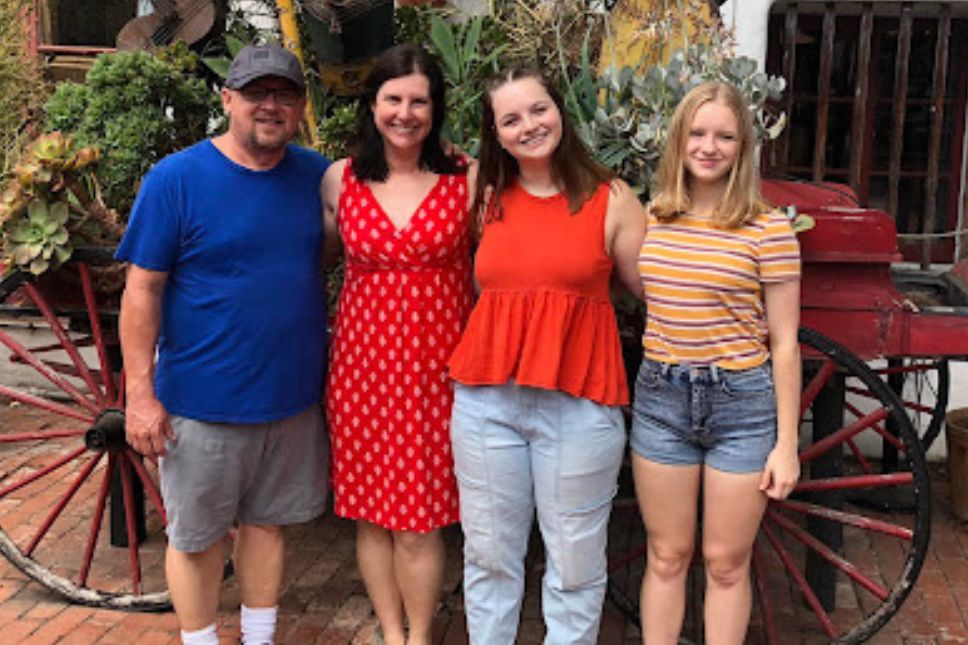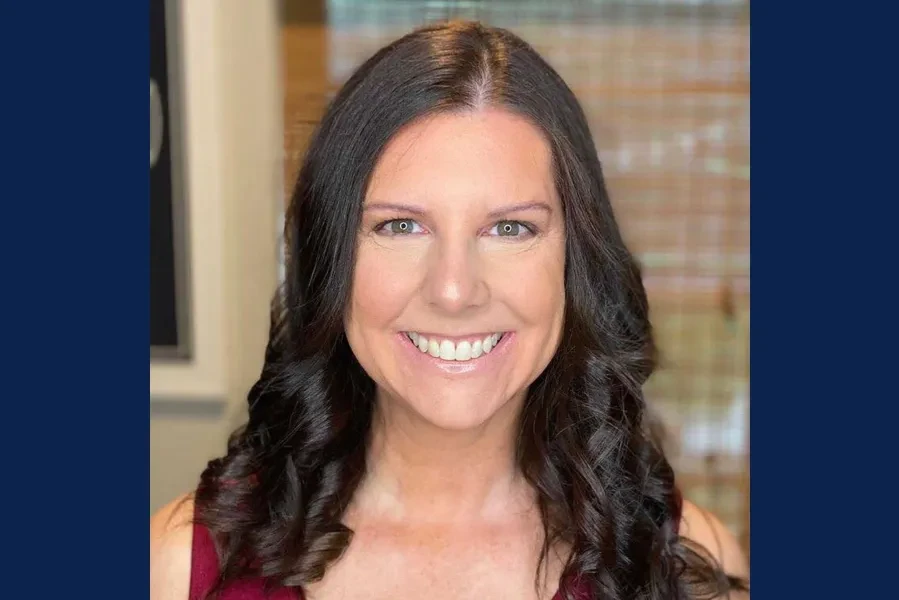Dr. Amy Johnson wants you to know it’s OK to laugh in class. The veteran educator and program chair for the Associate of Arts in Early Childhood Education (ECE) program at the University of Arizona Global Campus (UAGC) is among the school’s leading advocates for laughter in the classroom. She takes her career and responsibilities seriously, of course, but is trying to reverse the stigma that online learning is impersonal.
“Humor is a strength of mine, and I want students to see that I’m an actual human being,” Dr. Johnson explains. “I’ll put out an announcement like, ‘How are you feeling today?’ with a GIF and instructions for students to answer, and it becomes a running thread of all these bizarre GIFs.
“I just want to show all the ways that I’m human and use my personality to gain student participation and trust.”
Whether it’s a “How are you feeling?” GIF or a video of her hair “blowing like Beyoncé,” Dr. Johnson is changing perceptions for students in ECE, knowing graduates will be moving on to careers in which they’ll need to rely on their personalities as much as they’ll lean on the skills and knowledge gleaned from their courses.
It’s a lesson she learned early in her career. Born and raised in San Diego, Dr. Johnson started teaching after moving to the Fort Worth, Texas area, where she lives with her husband of 29 years, their two daughters, and the family’s black Labrador Retriever. Prior to joining UAGC, she taught at a brick-and-mortar college campus that was testing a hybrid in-person/online model. Online classrooms and discussion boards were fairly new at the time, and she quickly noticed communication challenges among her students – notably in the areas of tone and intent.
“One person wrote, ‘I observed a child that was two years old and using chopsticks,’ and someone replied, ‘Wow!’ and the next day, the student raised their hand and called it out because they believed they were being called a liar.
“That little statement had skewed the entire conversation, only because of how one person interpreted it. We had to talk about how the voice in your head can go two ways.”
That’s why Dr. Johnson always started her classes with a video explaining how the written word can be read differently by different people.
“I want the voice in their heads to be the voice I present to them in the beginning of class,” she says, “So when I’m giving constructive feedback, it comes through in a nice, pleasant voice. It sounds like, ‘I’m on your side, let’s do this together.’”
Getting to Know Dr. Johnson
We recently sat down with Dr. Johnson to get to know more about her life and her experience in the world of ECE. Check out our interview to learn more about this amazing UAGC professor and program chair.

Dr. Amy Johnson (second from left) enjoys spending time with her family.
UAGC: What motivated you to become a teacher?
Dr. Johnson: My dad was a lifelong teacher. He taught third grade. I taught elementary school and, after I had kids, I wanted to stay home with them. So, I decided to teach one college class at night so I could stay home during the day. Then, I was hired to teach infant and toddler development and it was the first time I “nerded out,” and it made me go back to get my doctorate in child development. That’s what led to a professor job. While I was getting my PhD, Ashford University (now UAGC) had a teaching assistant role. I started as a TA for psychology and then I became associate faculty in the early childhood education classes, and once I had my doctorate, I was hired as a professor.
UAGC: What are some of the most significant evolutions in learning that you’ve seen during your tenure?
Dr. Johnson: One of my personal evolutions has been my approach to a late policy. When I started teaching, I was very strict and required a document saying why they were late turning in their work, otherwise I wouldn’t take their work. I think that came from when I was a PhD student. I was at a different university and that’s what was required.
At UAGC, we’ve created a different culture. Life happens, and I’ve evolved from a very strict late policy to, “OK, you’re having a hard time, let’s work together and see how we’re going to get this done.” It’s more personal, a “Culture of Care” where we’re going to work together. It’s a caring atmosphere. Professionally, the most significant evolution has been artificial intelligence (AI). It hasn’t been overwhelming, but it’s getting tricky.
UAGC: What is your teaching philosophy?
Dr. Johnson: In my classes, all members are valued and participate as both a teacher and learner. I’m almost positive that I learned that from my dad.
UAGC: Did you have a mentor? How did that person impact your life or career?
Dr. Johnson: My dad has always been one of my mentors because he was a teacher. I met the mentor for the second half of my career when I transitioned to college for my PhD, Dr. Rose. She taught research methods and child development, and she was my dissertation chair, which was huge. The first class I had with Dr. Rose, I went home and told my husband, “This lady gave me so much homework to do! Doesn’t she realize I have a life?” But her work was really interesting, and it continued to make me want to learn about the topics. I thought, I need to change my “major professor” to Dr. Rose because she was the one who made me interested and kept me going. She was my advisor for four years, and she always pushed me to be more. She wouldn’t always answer the questions that I had. She would answer them partially, and I had to figure out the rest – which I hated – but it made me a great learner.
UAGC: In what ways do you try and serve as a role model?
Dr. Johnson: I do hard things, and I do more than what’s required. I also try to connect as a person to my students and the faculty that I oversee. It makes me more credible because I’ve made the human connection, and I can build on that a little bit with extra learning and push them a little harder.
UAGC: What do you love about teaching?
Dr. Johnson: I love the “a-ha!” moments, especially because my students work with children. I love it when I share something, or they share something, and everyone is like, “Oh man, I would love to use that!” I like seeing the learning that they’re going to put to work and take right to their own students. Also, hearing students say, “I already do this and didn’t even realize it was a best practice.” They feel validated.
UAGC: What’s been the highlight of your career?
Dr. Johnson: When I was promoted to program chair a year ago. That was just really cool knowing they have enough faith in me to lead the program.

Brains and brawn: Dr. Amy Johnson stays fit by doing CrossFit.
UAGC: What are three things your students might not know about you but would find interesting?
Dr. Johnson: I sang the National Anthem at the Padres-Mariners baseball game in 1999. I won a contest when I worked for a hospital, and anyone could submit a tape of themselves singing the National Anthem. I also do CrossFit, and if you do CrossFit, you have to talk about doing CrossFit. And I have a great sense of humor. I’m the one with the reputation of getting people to laugh even when they’re not supposed to be laughing.
UAGC: What are your favorite types of stories?
Dr. Johnson: My favorite movie is “Life Is Beautiful;” there’s so much love in it between the father and son and the husband and wife. I also love the book, “Unbroken.” I’ve read it several times. The movie wasn’t as good.
UAGC: What’s a fun game you play as a family?
Dr. Johnson: Spicy UNO. It’s when you make new rules. So, for example, the next five rounds of UNO, if someone plays a reverse card, everyone has to touch their nose. It’s adding rules to rules, and then by the end of the game, you have 85 rules, and it’s chaos.
UAGC: What has been your most memorable vacation or travel destination?
Dr. Johnson: My favorite place was Cambodia. We spent the summer there, before my dissertation. For my dissertation, I interviewed women who were out of the sex industry, and talked to them about what their childhoods were like and how they were recovering. We worked with prostituted women in Cambodia who were no longer in the sex industry, and they needed a trade. They were trained as garment workers – not in a sweat shop, but with a livable wage and childcare, it’s very humane. I trained workers to watch the children and taught some of the mothers parenting techniques.
--
Ashford University is now the University of Arizona Global Campus.
An online degree from the University of Arizona Global Campus does not lead to immediate teacher licensure in any state. If you want to become a classroom teacher, contact your state’s education authorities prior to enrolling at the University of Arizona Global Campus to determine what state-specific requirements you must complete before obtaining your teacher’s license.
